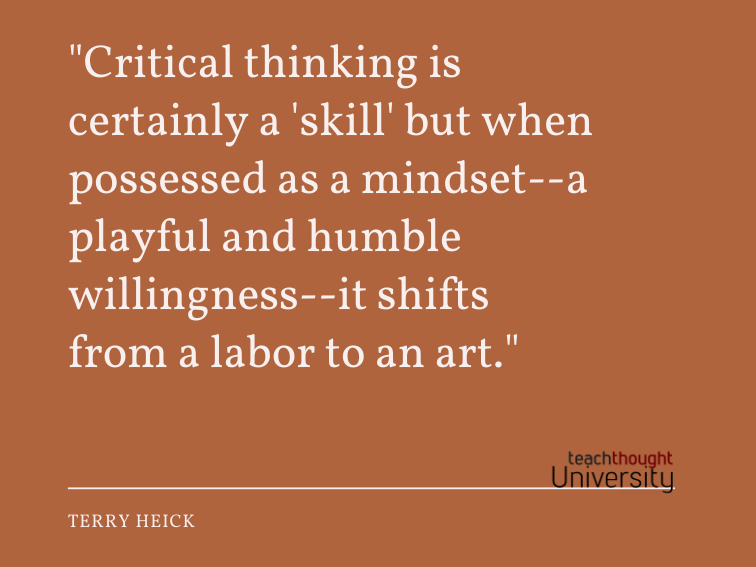

by Terry Heick
Every couple of months, I see a short article making the rounds that important reasoning isn’t a skill and for that reason can not be shown.
And due to the fact that it’s likewise challenging to gauge and contemporary public education and learning is driven by measurement, as a concept it sort of sits in the edge, unconcerned and mute.
Usually, these articles are in concerns to a conversation or research study related to Daniel Willingham, a psycho therapist at the College of Virginia that is frequently associated with this type of claim. Despite the fact that my reaction is to disagree, Willingham, naturally, knows much more concerning this subject than I do so my goal right here is not to disagreement that claim.
I do, nonetheless, think it’s feasible that we might misconstrue what it means to believe seriously, which I’ve discussed (though seldom or well sufficient) often times. In The Interpretation Of Critical Assuming , for instance, I said:
Important thinking is among the very first causes for change (individual and social) yet is a pariah in institutions– for no other reason than it conditions the mind to presume the type and feature of everything it sees, including your class and everything being taught in it. Obviously, crucial thinking without expertise is embarrassingly still, like a farmer without an area. They need each various other– thought and knowledge. They can also go away into each other as they work. When we’ve established that– that they’re separate, capable of combining, and require each other– we can get at the marrow and concern of this whole point.
Terry Heick
After enjoying the impact of disinformation on recent national and international occasions, it has struck me that important thinking is less of a skill and more of a willingness or habit. Simply put, essential thinking is a mindset. As I’ve claimed before about analysis– below, as an example, in Why Trainees Should Review — is that while it’s important that students can read, it’s more crucial that they do read.
And critical thinking– believing rationally, with factor and evidence, humbleness and expertise, understanding and suspicion– is similar: it is necessary that students can believe seriously but it’s more crucial that they do believe seriously.
By doing this, critical reasoning needs to be a state of mind.
Important Assuming Is A Mindset
Arstechnica (somewhat) just recently discussed exactly how set mindsets injure believing in talking about Why Can Just 24 % Resolve Bayesian Thinking Troubles in Natural Regularities: Regularity Phobia even with Chance Blindness
Equally as mathematics can be claimed to be a sort of language and science is a mindset, crucial thinking (while also being a ‘method’ of thinking) is initially a mindset– a desire to do so both preceded and proceeded by a motley collection of presuppositions and facilities and propensities and cognitive defaults and even ultimately characteristic that materialize when you read a book or have a conversation or skim a news headline or research study a concept.
Crucial reasoning is definitely a ‘ability’ yet when had as a state of mind– a playful and humble readiness– it changes from a labor to an art. It asks, ‘Is this real? By what standard? That would differ and why? What is the history of this issue or topic? What am I missing out on? What type of understanding am I missing out on to comprehend this extra closely and just how can I obtain them?
Critical thinking as a skill tries to comprehend.
Critical reasoning as a state of mind reads and listens as a witness and is haunted by what it does not understand and can not understand and after that, from that beginning point, starts the process of factor– of being and ending up being reasonable
Crucial reasoning isn’t psychological since its identity isn’t wrapped up in a viewpoint or ‘belief’ and being ‘incorrect’ is beneficial since it obtains us closer to being ‘right.’
Critical thinking is virtually impossible to apply without some type of bias however, as a frame of mind, it expects its own prejudices (see the interpretation confirmation prejudice , for example) as a security guard may watch for unfamiliar people.
Vital thinking is slow to make a decision and may not ‘make a decision’ at all since it realizes that when faced with new proof, it has to reconsider. And again. And once more.
And, as a mindset, it’s all right with the labor of all of it because it values reason more than support with crowds; it favors precision over perceived precision and encounters any situation dewy-eyed and humble and interested, looking for to understand and frightened to death of predisposition and insufficient knowledge and rational misconceptions and various other cognitive misdeeds that could lead it astray.
See? Vital thinking is an ability however it’s likewise a propensity and quality and light-making device in darkness for many becomes a frame of mind– both a way of knowing and a method of being.
And this is all component of means teaching it as a skill– similar to show trainees exactly how to read instead of why– is part of our difficulty in education and learning. As usual, we are asking the incorrect questions.
Essential Thinking Is An Attitude